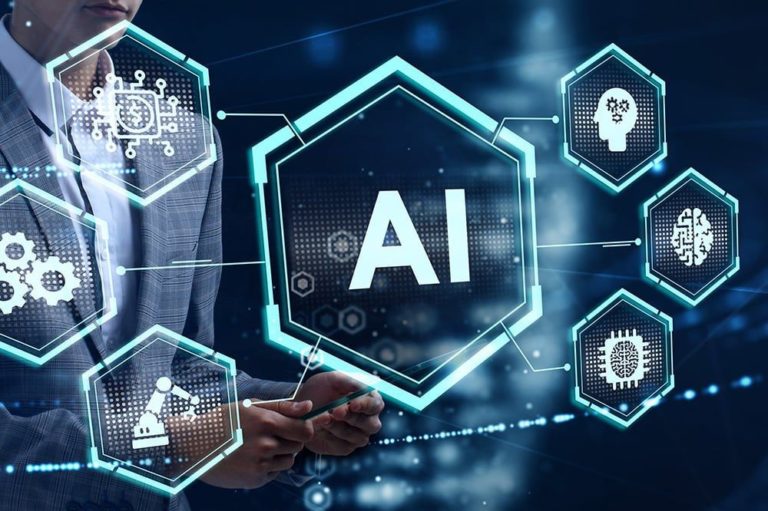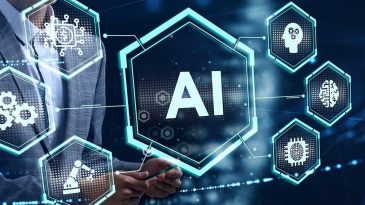- Tech
- Updated on April 25, 2025
The Impact of Artificial Intelligence on Various Industries in India

Artificial Intelligence (AI) has emerged as one of the most transformative technologies of the 21st century. In India, a country known for its strong tech industry, Artificial Intelligence is making significant strides across various sectors. From healthcare and education to manufacturing and agriculture, AI is driving innovation, enhancing efficiency, and contributing to economic growth. As AI technologies evolve, they are reshaping the way businesses and industries operate, creating new opportunities and challenges.
In this blog post, we will explore the impact of AI on several key industries in India, examine the specific applications of AI in each sector, and discuss the potential benefits and challenges of AI adoption in the country.
1. AI in Healthcare: Revolutionizing Patient Care
The healthcare sector in India is witnessing a technological revolution, with AI playing a pivotal role in enhancing medical practices and improving patient care. With a population of over 1.3 billion people, India faces significant challenges in delivering affordable, efficient, and high-quality healthcare. AI is helping to address these issues in various ways.
AI Applications in Healthcare
- Diagnostic Tools: AI-powered diagnostic tools are being used to analyze medical images, detect diseases, and provide early diagnosis. AI algorithms can detect conditions such as cancer, tuberculosis, and heart diseases with high accuracy, often outperforming human doctors in terms of speed and precision. For example, AI applications are used to analyze X-rays, CT scans, and MRIs to detect abnormalities.
- Personalized Medicine: AI is being used to analyze vast amounts of health data, including genetic information, to develop personalized treatment plans for patients. By considering a patient’s genetic makeup and medical history, AI can recommend the most effective treatments and drugs, reducing trial-and-error methods and improving outcomes.
- Telemedicine: AI-powered telemedicine platforms are gaining popularity in India, providing remote consultations and health services to underserved areas. AI chatbots and virtual assistants help patients access medical advice, schedule appointments, and receive basic consultations, reducing the burden on healthcare facilities.
- Drug Discovery: AI is accelerating drug discovery by analyzing massive datasets and identifying potential compounds for new medications. This is particularly useful in addressing diseases like cancer, diabetes, and neurological disorders, which require complex research and development processes.
Benefits of AI in Healthcare
- Improved diagnostic accuracy
- Faster medical research and drug development
- Increased accessibility to healthcare services, especially in rural areas
- Enhanced personalized care and treatment
Challenges of AI in Healthcare
- Data privacy and security concerns
- Lack of trained professionals to manage AI systems
- Ethical issues regarding AI decisions in critical healthcare scenarios
2. AI in Education: Transforming Learning Experiences

Education in India has evolved significantly over the years, but the sector still faces challenges such as overcrowded classrooms, limited access to quality resources, and a lack of personalized learning. AI is transforming the education sector by making learning more accessible, personalized, and efficient.
AI Applications in Education
- Personalized Learning: AI can analyze students’ learning patterns and tailor lessons to meet their individual needs. By adapting the content and difficulty level, AI enables personalized learning experiences that help students progress at their own pace, making education more effective.
- Automated Grading Systems: AI-powered tools are being used to automate grading and assessments, allowing teachers to focus on more interactive aspects of education. AI can grade assignments, essays, and even provide real-time feedback to students.
- Virtual Classrooms and Chatbots: AI-driven virtual assistants and chatbots are being implemented in online learning platforms to help students with queries, provide additional resources, and guide them through courses. These systems help bridge the gap between teachers and students, particularly in remote and underserved areas.
- Adaptive Learning Platforms: AI-powered adaptive learning platforms like BYJU’S, Vedantu, and Toppr are gaining popularity in India. These platforms provide real-time feedback, learning analytics, and personalized content, which have proven to be highly effective in improving student engagement and performance.
Benefits of AI in Education
- Personalized learning paths for students
- Improved teacher productivity and efficiency
- Access to quality education for students in remote areas
- Real-time feedback and assessment
Challenges of AI in Education
- High implementation costs
- Dependency on technology and internet access
- Data privacy concerns regarding students’ information
3. AI in Agriculture: Enhancing Productivity and Sustainability
Agriculture plays a significant role in India’s economy, employing more than half of the country’s workforce. However, Indian agriculture faces challenges such as unpredictable weather patterns, low productivity, and a lack of efficient farming techniques. Artificial Intelligence is poised to revolutionize the sector by enabling smarter farming practices.
AI Applications in Agriculture
- Precision Agriculture: AI-powered tools are used to monitor soil health, predict weather patterns, and optimize irrigation systems. These tools help farmers use resources more efficiently, increase crop yields, and reduce wastage.
- Predictive Analytics for Crop Management: AI models are used to predict crop diseases, pests, and potential yields by analyzing environmental data and historical trends. This enables farmers to take proactive measures, reducing the risk of crop loss and increasing productivity.
- Drones and Robotics: AI-powered drones and robots are being deployed in agriculture to monitor crops, spray fertilizers, and perform tasks such as weeding and harvesting. These technologies enhance productivity, reduce manual labor, and improve efficiency.
- Supply Chain Optimization: AI is helping optimize the agricultural supply chain by predicting demand, identifying the best routes for transportation, and ensuring that perishable goods reach markets in time. This reduces food waste and improves the efficiency of the agricultural supply chain.
Benefits of AI in Agriculture
- Increased crop yield and productivity
- Reduced use of water, fertilizers, and pesticides
- Better decision-making through data-driven insights
- Enhanced sustainability and environmental impact
Challenges of AI in Agriculture
- Limited access to AI technology in rural areas
- High initial investment costs for AI tools
- Lack of technical knowledge and training among farmers
4. AI in Manufacturing: Revolutionizing Production Processes
India’s manufacturing sector is vital to its economy, and Artificial Intelligence is playing a key role in reshaping how factories operate. AI is enabling smarter production processes, improving efficiency, and reducing costs.
AI Applications in Manufacturing
- Predictive Maintenance: AI-powered systems can predict equipment failures before they occur, minimizing downtime and reducing maintenance costs. By monitoring the health of machines in real-time, AI helps prevent costly breakdowns and improves the overall efficiency of production.
- Robotics and Automation: AI-driven robots are transforming production lines by automating repetitive tasks such as assembly, packaging, and quality control. These robots can work faster and more accurately than human workers, leading to higher production rates and lower costs.
- Supply Chain Optimization: AI is used to analyze data from multiple sources to optimize the manufacturing supply chain. It can predict demand fluctuations, optimize inventory levels, and identify the most efficient logistics routes, reducing waste and ensuring timely deliveries.
- Quality Control: AI-powered computer vision systems are being used to inspect products for defects, ensuring that only high-quality items reach the market. These systems can detect minute imperfections that might be missed by human inspectors, improving product quality and reducing returns.
Benefits of AI in Manufacturing
- Improved production efficiency and output
- Reduced operational costs through automation
- Better quality control and consistency
- Predictive maintenance for cost savings
Challenges of AI in Manufacturing
- High upfront costs for AI systems and equipment
- Resistance to automation and job displacement concerns
- Integration of AI with existing manufacturing infrastructure
5. AI in Finance: Enhancing Customer Experience and Security
The finance sector in India is evolving rapidly, with AI transforming how financial institutions operate. From customer service to fraud detection, Artificial Intelligence is reshaping the financial landscape in India.
AI Applications in Finance
- Fraud Detection and Prevention: AI algorithms are used to detect unusual financial transactions and prevent fraud in real-time. By analyzing transaction patterns, AI can identify potential fraud and flag it before any significant damage is done.
- Chatbots and Virtual Assistants: Many banks and financial institutions in India are adopting AI-powered chatbots and virtual assistants to improve customer service. These AI tools help customers with routine inquiries, process transactions, and offer personalized financial advice.
- Credit Scoring and Risk Management: AI is used to analyze customer data and assess creditworthiness. This enables financial institutions to provide more accurate credit scores and make better lending decisions, while also reducing the risk of loan defaults.
- Algorithmic Trading: AI-driven trading algorithms are used by financial institutions to analyze market data and make quick, data-driven investment decisions. These systems can react to market changes in real-time, improving trading strategies and boosting profitability.
Benefits of AI in Finance
- Enhanced security and fraud prevention
- Improved customer service through AI-powered assistants
- Better risk management and credit scoring
- Increased efficiency and accuracy in financial operations
Challenges of AI in Finance
- Data privacy concerns and regulatory compliance
- The complexity of integrating AI systems with legacy infrastructure
- Ethical concerns regarding AI-driven decision-making
Read Also : How to Use AI in Software Development
Conclusion
Artificial Intelligence is transforming various sectors in India, driving innovation and efficiency across industries like healthcare, education, agriculture, manufacturing, and finance. While the adoption of AI presents challenges such as high initial costs and the need for technical training, the long-term benefits far outweigh the obstacles. AI is helping businesses optimize their operations, improve customer service, and enhance productivity, making it a key factor in India’s economic growth.
As India continues to embrace Artificial Intelligence technology, the potential for job creation, improved standards of living, and enhanced global competitiveness is immense. The future of India’s industries lies in AI-driven solutions that will continue to evolve and contribute to a smarter, more connected world. The key to success will be investing in AI technologies, upskilling the workforce, and ensuring that AI adoption is inclusive, so that every sector benefits from this transformative technology.
Join the discussion
Related Articles
No results available
ResetTrending Articles


- Health
- Updated on January 9, 2026


- General
- Updated on January 7, 2026


- Health
- Updated on January 3, 2026

- General
- Updated on January 5, 2026


- General
- Updated on January 1, 2026


- General
- Updated on December 27, 2025


- General
- Updated on December 22, 2025


- General
- Updated on December 20, 2025


- General
- Updated on December 16, 2025


- General
- Updated on December 15, 2025
No results available
Reset


